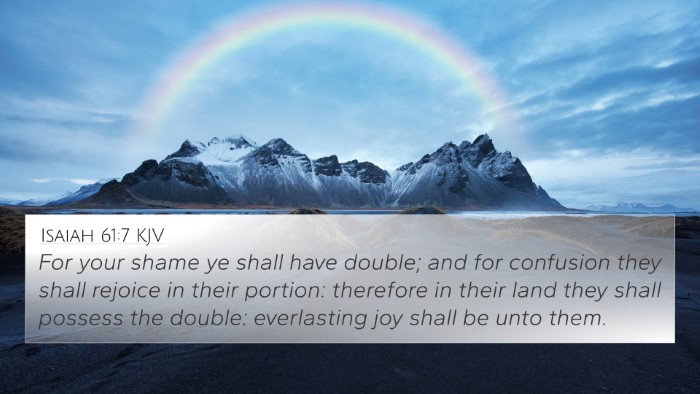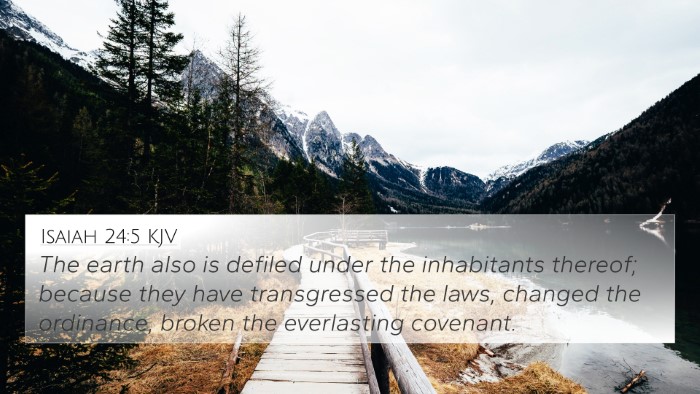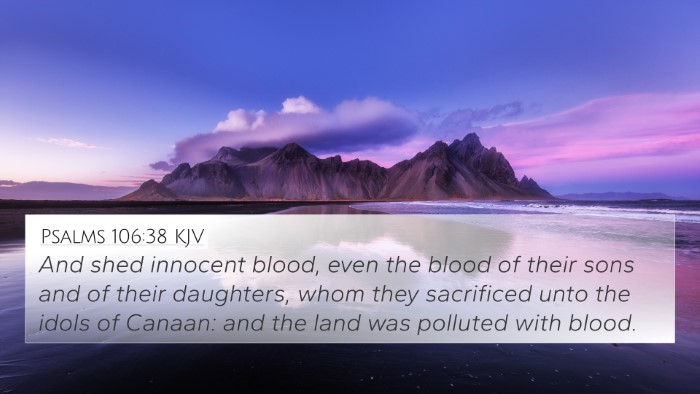Understanding Jeremiah 16:18
Jeremiah 16:18 states: “And first I will recompense their iniquity and their sin double; because they have defiled my land, they have filled mine inheritance with the carcases of their detestable and abominable things.” This verse presents a significant theological theme regarding divine justice and the consequences of sin. Below is a comprehensive analysis of this verse, drawing insights from various public domain commentaries.
Meaning and Interpretation
This verse is an expression of God's judgment against His people, who have turned away from Him. It reflects the pain and the consequences of sin in the relationship between God and His people.
Key Themes
- Divine Judgment: The double recompense signifies the severity of the punishment due to the serious nature of the sin committed.
- Defilement of the Land: The reference to the land being defiled emphasizes the holistic impact of sin, affecting not just individuals but also the community and the environment.
- Iniquity and Sin: There is a distinction made between general sin and iniquity, suggesting that iniquity refers to deeper, more deliberate acts against God.
Commentary Insights
Matthew Henry's Commentary: Henry highlights how sin brings about not only judgment but also a loss of inheritance. He reflects on the seriousness of sin against God’s holiness and the extensive consequences it brings upon the nation.
Albert Barnes' Notes: Barnes emphasizes the term "double," explaining that it can denote completeness in punishment. The verse serves as a reminder that unrepentant sin cannot go unpunished and that God's justice will prevail over all transgressions.
Adam Clarke's Commentary: Clarke discusses the 'carcases' referenced in this verse as symbolic of the idolatrous practices that have overtaken God’s people, indicating spiritual death and the detestable rites that grieved God’s heart.
Cross References
This verse connects with several other scriptures that illuminate its meaning:
- Isaiah 40:2: Addresses the comfort and the recompense for sins, relating to God's sovereign justice.
- Ezekiel 18:30: Calls for repentance to avoid the consequences of iniquity.
- Jeremiah 32:30: Highlights the idolatrous behavior of Israel, corresponding to the defilement mentioned in Jeremiah 16:18.
- Revelation 16:6: Discusses the repayment for bloodshed, paralleling the themes of justice and recompense.
- Deuteronomy 32:34-35: Reminds readers of God's impending judgment upon unrepentant sin.
- Galatians 6:7: Affirms the principle that we reap what we sow, analogous to the double recompense mentioned in this passage.
- Hosea 4:3: Reflects on how sin leads to consequences, further illustrating the defilement of a people.
- Lamentations 3:39: Points to questioning the divine judgment over sin and iniquity, contributing to the overarching theme of God's justice.
- Matthew 23:37: Jesus laments over Jerusalem, much like Jeremiah, emphasizing how sin has led to national calamity.
- Numbers 35:33-34: Reinforces the idea that the land is affected by the sins of its inhabitants.
Additional Insights on Cross-Referencing
Engaging in cross-referencing Biblical texts can deepen the understanding of themes present in Jeremiah 16:18. Exploring the connections between Old and New Testament passages reveals how the principles of sin and judgment echo throughout Scripture.
Tools for Cross-Referencing
Utilizing tools such as a Bible concordance or a cross-reference Bible study guide can assist in identifying these connections. Here are some methodologies:
- Bible reference resources: These can provide insights into thematic connections.
- Bible chain references: Use these to follow a theme across multiple books.
- Comparative Bible verse analysis: Enables one to see relationships between verses and concepts.
- Detailed cross-reference between Gospels: Helps illuminate how the teachings of Jesus relate back to the Old Testament.
Learning Through Cross-References
For anyone seeking a more comprehensive understanding of Biblical themes, learning to identify connections between verses can enhance one's study. This approach encourages deeper engagement with the text, leading to a richer understanding of God's narrative and His covenantal promises throughout history.
Conclusion
Jeremiah 16:18 serves as a powerful reminder of the gravity of sin and the reality of divine judgment. Through careful analysis and cross-referencing, we can appreciate the complexity and depth of God's Word. The thematic connections across the scripture enhance our understanding of His nature and the importance of repentance, emphasizing the consistency of God's justice and mercy throughout the Bible.



















